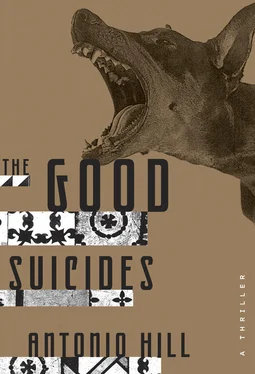Antonio Hill - The Good Suicides
Здесь есть возможность читать онлайн «Antonio Hill - The Good Suicides» весь текст электронной книги совершенно бесплатно (целиком полную версию без сокращений). В некоторых случаях можно слушать аудио, скачать через торрент в формате fb2 и присутствует краткое содержание. Жанр: Триллер, на английском языке. Описание произведения, (предисловие) а так же отзывы посетителей доступны на портале библиотеки ЛибКат.
- Название:The Good Suicides
- Автор:
- Жанр:
- Год:неизвестен
- ISBN:нет данных
- Рейтинг книги:5 / 5. Голосов: 1
-
Избранное:Добавить в избранное
- Отзывы:
-
Ваша оценка:
- 100
- 1
- 2
- 3
- 4
- 5
The Good Suicides: краткое содержание, описание и аннотация
Предлагаем к чтению аннотацию, описание, краткое содержание или предисловие (зависит от того, что написал сам автор книги «The Good Suicides»). Если вы не нашли необходимую информацию о книге — напишите в комментариях, мы постараемся отыскать её.
The Good Suicides — читать онлайн бесплатно полную книгу (весь текст) целиком
Ниже представлен текст книги, разбитый по страницам. Система сохранения места последней прочитанной страницы, позволяет с удобством читать онлайн бесплатно книгу «The Good Suicides», без необходимости каждый раз заново искать на чём Вы остановились. Поставьте закладку, и сможете в любой момент перейти на страницу, на которой закончили чтение.
Интервал:
Закладка:
Alba won’t stop. When she gets like this, Susana is the only one who can comfort her. I can’t … I can’t leave her crying now her mother’s no longer here.
44
It was almost nine o’clock on Friday night and Héctor was still in his office, alone. The confession, which Mar had finally signed, was on his desk. He added it to the file, lacking the definitive report that fell to Agent Fort to write up, not able to get rid of the uncomfortable, uneasy feeling that usually overcame him at the end of cases as complex as this one, although never with such force.
You’re getting old, Salgado, he said to himself. He wasn’t sure it was just age. He was sure he’d done a good job. Mar Ródenas had killed Amanda Bonet and prompted the suicide of Sara Mahler. But she was right about one thing: the two dead boys in Garrigàs deserved justice. And he wouldn’t rest until he’d achieved it.
He attached the note to the rest of the papers, not knowing whether it was rage, helplessness or grief, pure and simple, that was clouding his vision. The pain given off by that desperate letter was more than anyone should bear and he knew that in his hours of insomnia Gaspar Ródenas would haunt him. He needed something to restore the little faith in humanity he had left or nothing would be worth it anymore.
He wondered how those four seemingly normal people had been able to live with it. He tried to think about how they would be feeling at that moment, but he couldn’t put himself in their place.
Sílvia was lying on the sofa of her house, in the dark, listlessly watching the weather forecast announcing the possibility of heavy snowfall in Barcelona that night. She’d put her phone on silent so as not to hear César’s calls, nor his messages pleading for forgiveness. If he’d really mattered to her, she’d still have been unable to forgive him. There was no pardon for César Calvo because it simply wasn’t worth conceding it to him. Just as there would be none for any of them if the whole truth were discovered. She was ready to accept it. Live with it. Last thing that evening, her brother had told her that now the case seemed resolved, the sale of the company would go ahead, although he took the opportunity to hint that he couldn’t promise her that the new owners would want to continue relying on her. Sílvia hadn’t bothered to respond; she was too busy looking for a boarding school for Emma, not abroad, as they’d once discussed, but in Ávila: a religious school for children of good families, which her daughter would detest with all her heart. She’d even called the school to ask if they would admit her mid-term, as a special favor. Fortunately, money still opened doors and Emma would begin a new life, away from her, at the beginning of February. She had communicated this to her a while before, in a tone that brooked no argument.
At least that problem is solved, she thought, unable to face all the others. She leaned her head on the armrest and lay down fully, eyes fixed on the screen, where images of past snowfalls appeared, and closed her eyes out of weariness. The next thing she knew was a hand grabbing her hair and a rough voice, different from the one she knew as her daughter’s, whispering in her ear: “If you think I’m going to that convent you’re crazy, you bitch.” Sílvia smothered a moan of pain and saw Emma, smiling, leaving as silently as she had come.
She remained still, curled up on the sofa trembling, more from fear than rage. Had it not been for the pain, she’d have thought what had happened was a nightmare. But no, it was real. As real as the music coming from Emma’s room at a deafening volume. Not knowing what to do, Sílvia looked for César’s number in her cell phone contacts and called him: there was no one else to turn to. César was strong, he could protect her … After waiting awhile she had to give in to the evidence that no one was going to answer and, still shaking, she switched off the television and shut herself in her room.
The music kept playing like a declaration of war. That night Sílvia decided to surrender without a fight and pretend not to hear it.
César would happily have answered if he’d received the call an hour before, while he was still at home, contemplating the fucking stained carpet that seemed to sum up his present and a large part of his future. Sílvia forgiving him seemed as impossible as forgetting the taste of Emma. So, when he’d smoked an entire packet of cigarettes waiting for an answer that didn’t come, he decided to go out to do something he’d put aside for a long time. He didn’t take his phone.
The girly bar on Muntaner embraced him with the kind of servile affection he was seeking. He was sure that for the price of a drink, even if it was absurdly high, this place of dark corners would offer him what he needed to calm his nerves. He realized he hadn’t showered since the morning, but he didn’t care. No one there was going to throw it back in his face. At the bar, glass in hand, he scrutinized the faces of the girls working in the place, looking for someone who would awaken enough desire for him to open his wallet. After a while he found them all old, faded, so different from what he had in mind that he didn’t feel able to fuck them. Then, after draining the whiskey in a gulp, he asked for another and took the opportunity to ask the waiter, in a very low voice: “Listen, know where I can find a young girl? You know what I mean: young-really young.”
Octavi Pujades’ wife died at dusk, when the snow was still only a threat. She simply fell asleep mid-afternoon and never woke up. Going in to see her before dinner, he realized her heart wasn’t beating.
He closed her eyes and sat down on the bed beside her. He knew he should call his children and give them the news, start to prepare everything, but he needed to be alone with her for a while. He stroked her forehead and said a prayer in a low voice because it was the only thing that seemed appropriate. He’d already said good-bye on many nights when he’d believed it was all over, so now, the moment having come, he didn’t have too much to say to her. Eugènia had died too many times for the definitive end really to affect him.
He went to the door of the house in an attempt to fill his lungs with air that didn’t smell of death and, unable to help it, he thought not of his wife but of Gaspar, Sara, Amanda and the two dead boys. He told himself that he was the oldest of all, the one who logically should have gone first. And yet, there he was. Alive, smoking a cigarette that refused to kill him and with a relatively well-insured future before him. If everyone kept quiet, of course. He had to trust in that.
That night he didn’t even hear the howls of the neighboring dogs. The silence was absolute. It would have unsettled someone else, but for him it was already normal. Soon the house would fill with people, children, in-laws, friends, acquaintances, and this peace would end. He sighed: he’d have to go through it. It was the penultimate chapter before beginning a new story. A widower, about to take early retirement, and with enough money to face his twilight age with dignity. Ironic that, if nothing changed, he couldn’t complain about how things had gone for him.
He had to force himself not to smile when he picked up the phone to call his son and tell him that his mother had died.
Manel didn’t like storms, or rain. And snow even less, which according to the news was coming closer to the city. A snowfall that would conclude some horrible, shameful days in which he’d been treated like a criminal. He, who’d scarcely done anything except watch and agree. They’d locked him in a filthy place, with a couple of stinking prisoners, and then taken him to a public hospital where he had to wait to be attended amid a mountain of old, sick people. Bastards. It wasn’t fair. Hadn’t it been Sílvia who was driving the van? And Gaspar who’d given that dirty North African the whack with a spade? And in the end it was this Mar Ródenas who had killed Amanda and pushed Sara to suicide. But only he, Manel, had had to suffer hell. He, who’d just followed the directives of the majority without hurting anybody.
Читать дальшеИнтервал:
Закладка:
Похожие книги на «The Good Suicides»
Представляем Вашему вниманию похожие книги на «The Good Suicides» списком для выбора. Мы отобрали схожую по названию и смыслу литературу в надежде предоставить читателям больше вариантов отыскать новые, интересные, ещё непрочитанные произведения.
Обсуждение, отзывы о книге «The Good Suicides» и просто собственные мнения читателей. Оставьте ваши комментарии, напишите, что Вы думаете о произведении, его смысле или главных героях. Укажите что конкретно понравилось, а что нет, и почему Вы так считаете.












